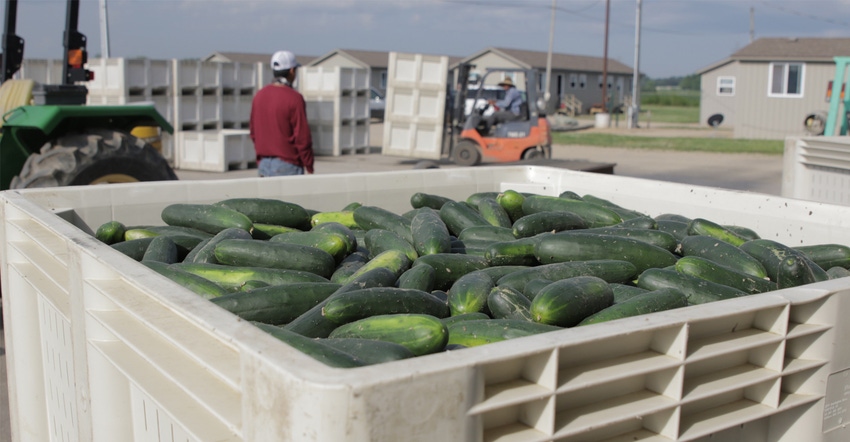March 30, 2020

The U.S. Senate and House late last week passed the Coronavirus Aid, Relief, and Economic Security Act to help families, workers and businesses during the national coronavirus crisis.
A $9.5 billion dedicated disaster fund will help Michigan farmers who are experiencing financial losses from the coronavirus crisis, including targeted support for fruit and vegetable growers, livestock and dairy farmers, and local food producers.
“This health care crisis is affecting every family across the country,” said Sen. Debbie Stabenow, a ranking member of the U.S. Senate Committee on Agriculture, Nutrition, and Forestry. “The relief package will provide stability for our farmers and ensure the American people have a safe and stable food supply. Our bipartisan agreement includes targeted assistance to farmers who are experiencing severe financial losses during the pandemic, including fruit and vegetable growers, dairy farmers, and local food producers.”
Michigan Farm Bureau President Carl Bednarski is pleased to see the Senate COVID-19 appropriations bill pass.
“We applaud congressional leaders and the Trump administration for striking a deal and recognizing the unique needs facing our industry and our neighbors,” Bednarski said. “And we appreciate the fact Congress granted USDA some flexibility in how best to provide relief to the farming community negatively impacted by the virus.
“As our industry and consumers continue to face uncertainty, this bill helps equip the agencies and departments tasked with helping agriculture navigate through this unprecedented time. It also specifically earmarks $9.5 billion for USDA to help our producers who are negatively impacted by the outbreak, including fruits and vegetables, livestock and dairy — all critical Michigan industries. We will be working with our members to relay all the possible concerns farmers are experiencing from the virus to USDA, so they have a complete picture of what's happening on the ground when they decide how to provide relief."
Bednarski noted that additional funds to the Commodity Credit Corp. fund also will position USDA to better help farmers. And Michigan Farm Bureau national legislative counsel John Kran is looking ahead to the aid package’s final approval in the U.S. House.
“Our county Farm Bureau members are grateful to our two U.S. senators for their support of this very important aid package,” Kran said.
Here are some things the Coronavirus Aid, Relief, and Economic Security Act provides:
Relief for farmers and ranchers
A $9.5 billion dedicated disaster fund will help farmers who are experiencing financial losses from the coronavirus crisis, including targeted support for fruit and vegetable growers, dairy and livestock farmers, and local food producers, who have been shorted from receiving emergency assistance in the past.
The legislation includes $14 billion to fund the farm bill’s farm safety net through the Commodity Credit Corp.
Farmers and agricultural and rural businesses are eligible to receive up to $10 million in small business interruption loans from eligible lenders, including Farm Credit institutions, through the Small Business Administration. Repayment forgiveness will be provided for funds used for payroll, rent or mortgage, and utility bills.
Another $3 million is allocated to increase capacity at the USDA Farm Service Agency to meet increased demand from farmers affected by the coronavirus crisis.
Assistance for small towns and rural communities
Guaranteed loans totaling $1 billion are available to help rural businesses weather the economic downturn.
Another $100 billion will go to hospitals, health care providers and health care facilities, including those in rural areas. The bill provides $25 million for telemedicine tools to help rural patients access medical care, no matter where they live.
An additional $100 million is allocated for high-speed internet expansion in small towns and rural communities.
More than $70 million will help the U.S. Forest Service serve rural communities and reduce the spread of coronavirus through personal protective equipment for first responders and cleaning of facilities.
Protections for consumers and the food supply
The bill provides $55 million for inspection and quarantine at U.S. borders to protect against invasive pests and animal disease; $33 million for overtime and temporary food safety inspectors� to protect America’s food supply at meat processing plants; $45 million to ensure quality produce and meat reach grocery stores through increased support for the Agricultural Marketing Service; and $1.5 million to expedite EPA approvals of disinfectants needed to control the spread of the coronavirus.
Food access for families
The bill also allocates $15.8 billion to fund food assistance changes made in the Families First Coronavirus Response Act; $9 billion to fund child nutrition improvements made in the Families First Coronavirus Response Act; $450 million to provide food banks with additional resources for food and distribution; and $100 million for food distribution in tribal communities to provide facility improvements, equipment upgrades and food purchases.
Source: Michigan Farm Bureau, which is solely responsible for the information provided and is wholly owned by the source. Informa Business Media and all its subsidiaries are not responsible for any of the content contained in this information asset.
You May Also Like




